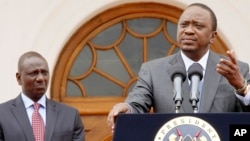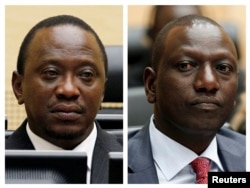Tension is brewing in Kenya's ruling coalition between allies of Kenyan President Uhuru Kenyatta and backers of his deputy, William Ruto. Ruto's allies say the government is not supporting their man at the International Criminal Court, where he is on trial for alleged crimes against humanity.
Kenyan media outlets report that political leaders from the Rift Valley region will hold a meeting this weekend to pray for their leader, Deputy President William Ruto.
Some observers say the gathering will really focus on the fallout from the ICC's latest ruling in the Ruto case. Judges ruled last month that prosecutors can use statements from witnesses who later recanted their testimonies. The ruling could spell trouble for Ruto, who critics have accused of witness tampering.
It could also cause rifts in the ruling Jubilee coalition. Supporters of Ruto say the government has failed to support the deputy president in his fight to avoid conviction.
Ethnic tensions
Kenyan political writer Barrack Muluka tells VOA that meetings like the one this weekend will create tension among the different ethnic groups in the Rift Valley.
“These ramblings do spell some cause for concern among such persons [other communities living in Rift Valley]," he said. "They are saying their person has been left out. Remember that the possession here — when we say our person is something [it] boils down to ethnic definitions of who we are, who then our person is, who we think has abandoned him and that definitely will not augur so well for those places.”
President Kenyatta and Ruto were both accused of helping to organize post-election violence seven years ago that killed more than 1,100 people and displaced 600,000 from their homes. Both men deny the charges.
Back then, the two leaders were on opposite sides of the fighting. But they came together ahead of 2013 presidential elections, issuing a joint call to reject the ICC as part of their campaign.
Kenyatta charges dropped
Last December, the International Criminal Court prosecutor withdrew charges against Kenyatta, citing a lack of evidence.
Muluka says if Ruto is found guilty, it’s going to put the president and the country in a difficult situation.
“[If] he hands him over, that opens a floodgates of a problem with people sitting with him in Jubilee alliance from the Kalenjin community," he said. "He doesn’t hand him over, that makes him a pariah, president superintending over a pariah state, so he is squarely cast between a rock and a hard place.”
Kenya’s attorney general told the Daily Nation newspaper the state is doing everything it can to help the deputy president.





